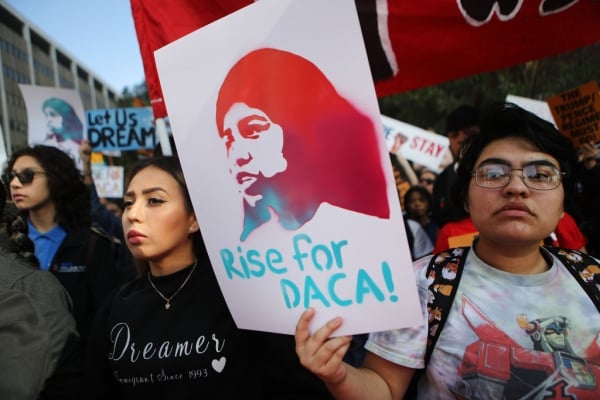
DACA Allows Immigrants to Pursue Education, Better Jobs
The Obama-era program is again under threat from the Trump administration.
Mario Tama/Staff/Getty Images News
Nearly all Deferred Action for Childhood Arrivals recipients who responded to a recent survey say DACA allowed them to pursue educational opportunities they wouldn’t have been able to without it or opened the doors for them to pursue education in the future.
The annual survey of DACA recipients is conducted by the U.S. Immigration Policy Center at the University of California, San Diego; United We Dream; the National Immigration Law Center; and the Center for American Progress.
DACA, the Obama-era program that offered some undocumented immigrants who were brought to the U.S. as young children protection from deportation and authorized them to work, is currently at risk amid legal challenges in Texas. President Donald Trump also previously tried to rescind the program during his first term in office, and the administration recently encouraged DACA recipients to self-deport.
Eighty of the 433 DACA recipients who completed the survey said they are currently in school, with 82.7 percent pursuing at least a bachelor’s and almost half pursuing a graduate degree.
Losing DACA status would affect their ability to access education, the respondents reported. While 100 percent of the respondents currently in school said they would likely continue their education if they needed to do so as DACA recipients, only 29.3 percent said the same would be true if they no longer had DACA. Two-thirds of all respondents said that, if they were deported, they would be unable to access quality education for themselves and their families.
DACA also leads to strong employment outcomes; 60 percent of respondents said they were able to get a job with better pay after receiving DACA. Just over half also said they were able to get jobs that aligned better with their education and that aligned well with their career goals.
Survey respondents indicated high levels of stress about the Trump administration’s deportation crusade. Fifty-seven percent say they worry about being deported at least once a day, and a similar amount said that’s how often they worry about a family member being deported. Of the respondents with children, four in every five said they worry about their children being deported at least daily.

Source link


